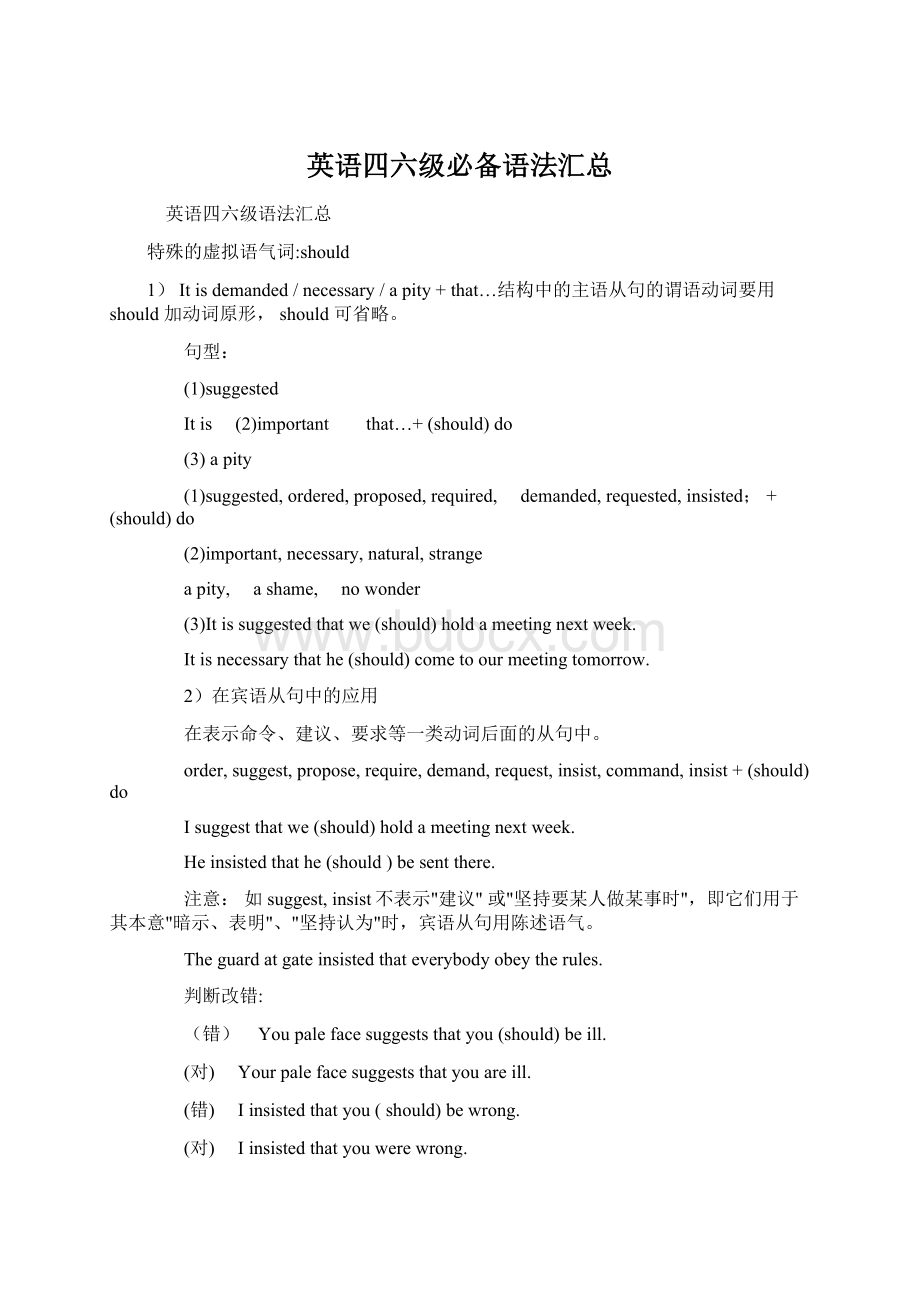英语四六级必备语法汇总.docx
《英语四六级必备语法汇总.docx》由会员分享,可在线阅读,更多相关《英语四六级必备语法汇总.docx(20页珍藏版)》请在冰豆网上搜索。

英语四六级必备语法汇总
英语四六级语法汇总
特殊的虚拟语气词:
should
1)Itisdemanded/necessary/apity+that…结构中的主语从句的谓语动词要用should加动词原形,should可省略。
句型:
(1)suggested
Itis
(2)important that…+(should)do
(3)apity
(1)suggested,ordered,proposed,required, demanded,requested,insisted;+(should)do
(2)important,necessary,natural,strange
apity, ashame, nowonder
(3)Itissuggestedthatwe(should)holdameetingnextweek.
Itisnecessarythathe(should)cometoourmeetingtomorrow.
2)在宾语从句中的应用
在表示命令、建议、要求等一类动词后面的从句中。
order,suggest,propose,require,demand,request,insist,command,insist+(should)do
Isuggestthatwe(should)holdameetingnextweek.
Heinsistedthathe(should)besentthere.
注意:
如suggest,insist不表示"建议"或"坚持要某人做某事时",即它们用于其本意"暗示、表明"、"坚持认为"时,宾语从句用陈述语气。
Theguardatgateinsistedthateverybodyobeytherules.
判断改错:
(错) Youpalefacesuggeststhatyou(should)beill.
(对) Yourpalefacesuggeststhatyouareill.
(错) Iinsistedthatyou(should)bewrong.
(对) Iinsistedthatyouwerewrong.
3)在表语从句,同位语从句中的应用
在suggestion,proposal,idea,plan,order,advice等名词后面的表语从句、同位语从句中要用虚拟语气,即(should)+动词原形。
Myideaisthatwe(should)getmorepeopletoattendtheconference.
Imakeaproposalthatwe(should)holdameetingnextweek.
一般现在时代替完成时
1)有些动词用一般现在时代替完成时:
hear,tell,learn,write,understand,forget,know,find,say, remember.
Ihear(=haveheard)hewillgotoLondon.
Iforget(=haveforgotten)howoldheis.
2)句型"Itis…since…"代替"Ithasbeen…since…"
3)Itis(=hasbeen)fiveyearssincewelastmet.
不定式的特殊句型soasto
1)表示目的;它的否定式是soasnottodo。
Tomkeptquietabouttheaccidentsoasnottolosehisjob.
汤姆对事故保持沉默是为了不丢掉他的工作。
Goinquietlysoasnottowakethebaby.
轻点进去,别惊醒了婴儿。
2) sokindasto---劳驾
Wouldyoubesokindastotellmethetime?
劳驾,现在几点了。
none,few,some,any,one,ones
一、none无
1)none作主语,多与of构成短语noneof。
在答语中,none可单独使用。
Arethereanypicturesonthewall?
None.
2)none作主语,谓语动词单复数均可。
但如做表语,则其单复数与表语一致。
Itisnoneofyourbusiness.
二、few一些,少数
few作主语时,谓语动词用复数,多用于肯定句。
三、some一些
1)可与复数名词及不可数名词连用。
2)当做"某一"解时,也可与单数名词连用。
(=acertain)
Youwillbesorryforthissomeday.
总有一天,你会后悔这件事的。
Acertain(some)personhasseenyoubreaktherule.
某些人不同意你的看法。
注意:
(1)在肯定疑问句中用some代替any。
(2)some用于其他句式中:
a. 肯定疑问句中:
说话人认为对方的答案会是肯定的,或期望得到肯定回答时。
Wouldyoulike句式中,表委婉请求或建议,如:
Wouldyoulikesomecoffee?
b. 在条件状语从句中表示确定的意义时,如:
Ifyouneedsomehelp,letmeknow.
c. some位于主语部分,
Somestudentshaven‘tbeentherebefore.
d. 当否定的是整体中的部分时,some可用于否定句。
如:
Ihaven‘theardfromsomeofmyoldfriendstheseyears.
这些年我没有收到一些老朋友的信。
四、any一些
1) any多用于否定句和疑问句和条件状语从句中。
当句中含有任何的意思时,any可用于肯定句。
Herearethreenovels.Youmayreadany. 这有三本小说,你可任读一本。
五、one,ones为复数形式
ones必须和形容词连用。
如果替代的名词时无形容词在前,则用some,any,而不
用ones。
Haveyouboughtanyrulers?
Yes,I‘veboughtsome.
only在句首要倒装的情况
Onlyinthisway,canyoulearnEnglishwell.
Onlyafterbeingaskedthreetimesdidhecometothemeeting.
如果句子为主从复合句,则主句倒装,从句不倒装
Onlywhenheisseriouslyill,doesheeverstayinbed.
every,no,all,both,neither,nor
1)不定代词有
all,both,every,each,either,neither,more,little,few,much,many,another,other,some,any,one,no以及some,something,anything,everything,somebody,someone,anybody,anyone,nothing,nobody,noone,none,everybody,everyone.等。
2)不定代词的功能与用法
a. 除every和no外不定代词既可用作名词,也可用作形容词。
every和no在句中只能作定语。
Ihavenoideaaboutit.
b. all都,指三者以上。
all的主谓一致:
all的单复数由它所修饰或指代的名词的单复数决定。
Allgoeswell. 一切进展得很好。
all通常不与可数名词单数连用,如:
不说allthebook,而说thewholebook。
但all可与表时间的可数名词单数连用,如allday,allnight,alltheyear;但习惯上不说allhour,allcentury。
all还可以与一些特殊的单数名词连用,如allChina, allthecity, allmylife,alltheway
3) both 都,指两者。
a. both与复数动词连用,但both…and…可与单数名词连用。
b. both,all都可作同位语,其位置在行为动词前,be动词之后。
如果助动词或情态动词后面的实义动词省去,则位于助动词或情态动词之前。
WhocanspeakJapanese?
Weboth(all)can.
4) neither 两者都不
a. neither作主语时,谓语动词用单数。
b.作定语与单数名词连用,但neither…nor用作并列连词,可与复数名词连用。
其谓语采用就近原则。
c. 可用于下列句型,避免重复。
Shecan‘tsing,neither(can)he.
neither与nor
d. 如前句是否定式从句,则主句用neither,而不用nor。
Ifyoudon‘tdoit,neithershouldI. 如果你不干,我也不干。
e.如后连续有几个否定句式,则用nor,不用neither。
Hecan‘tsing,nordance,norskate.
比较may和might
1)表示允许或请求;表示没有把握的推测;may放在句首,表示祝愿。
MayGodblessyou!
Hemightbeathome.
注意:
might表示推测时,不表示时态。
只是可能性比may小。
2)成语:
may/mightaswell,后面接不带to的不定式,意为"不妨"。
Ifthatisthecase,wemayaswelltry.
典型例题
Peter___comewithustonight,butheisn‘tverysureyet.
A.must B.may C.can D.will
答案B.表可能性只能用may. 此句意可从后半句推出。
让步状语从句讲解
though,although
注意:
当有though,although时,后面的从句不能有but,但是though和yet可连用
Althoughit‘sraining,theyarestillworkinginthefield.
虽然在下雨,但他们仍在地里干活。
Heisveryold,buthestillworksveryhard.
虽然他很老,但仍然努力地工作。
Thoughthesorebehealed,yetascarmayremain.
伤口虽愈合,但伤疤留下了。
(谚语)
典型例题
1)___sheisyoung,sheknowsquitealot.
A.When B.However C.Although D.Unless
答案:
C。
意为虽然她很年轻,却知道许多。
2) as,though引导的倒装句
as/though引导的让步从句必须表语或状语提前(形容词、副词、分词、实义动词提前)。
Childas/thoughhewas,heknewwhatwastherightthingtodo.
=Thoughhewasasmallchild,heknewwhatwastherightthingtodo.
注意:
a. 句首名词不能带任何冠词。
b. 句首是实义动词,其他助动词放在主语后。
如果实义动词有宾语和状语,随实义动词一起放在主语之前。
Tryhardashewill,heneverseemsabletodotheworksatisfactorily.
=Thoughhetrieshard,heneverseems…
虽然他尽了努力,但他的工作总做的不尽人意。
3) everif,eventhough. 即使
We‘llmakeatripeventhoughtheweatherisbad.
4)whether…or- 不管……都
Whetheryoubelieveitornot,itistrue.
5) "nomatter+疑问词"或"疑问词+后缀ever"
Nomatterwhathappened,hewouldnotmind.
Whateverhappened,hewouldnotmind.
替换:
nomatterwhat=whatever
nomatterwho=whoever
nomatterwhen=whenever
nomatterwhere=wherever
nomatterwhich=whichever
nomatterhow=however
注意:
nomatter不能引导主语从句和宾语从句。
(错)Nomatterwhatyousayisofnousenow.
(对)Whateveryousayisofnousenow.
你现在说什么也没用了。
(Whateveryousay是主语从句)
(错)Prisonershavetoeatnomatterwhatthey‘regiven,
(对)Prisonershavetoeatwhateverthey‘regiven. 囚犯们只能给什么吃什么。
从SodoI谈起
两人对话,乙方对甲方的问话常可用简短回答作出反应。
例如:
Doyoulikeit?
--Yes,Ido.这同样适用于陈述句的场合:
Youworrytoomuch.--No,Idon‘t.在后一种情况下,乙方也能"So+do+主语"之类的结构表示看法。
例如甲方说"我喜欢苹果",乙方如果想表示"我也喜欢苹果",英语可以说:
A:
Ilikeapples.
B:
SodoI.(=Ilikeapples,too。
)
这里的so在意义上相当于inthesameway,即同样、也那样,作简短反应表示同样看法时常用之。
就诸如此类的四种结构略作介绍。
1."So+do+主语"结构在简短反应中表示"我也如此"或"另外一个人也如此"时,也就是主语不同于上文的主语以及上文并无可用于构成倒装的动词(即操作词时),可用此结构。
例如:
A:
Ilikeplayingfootball.B:
SodoI./Sodoesmybrother./Sodidmyfather.如果上文有可用于构成倒装的动词时,则用相同的动词或根据不同人称用同类的动词。
Imustgo--SomustI.JohncanspeakFrench.--SocanI.I‘vegotanewcar.--SohasJohn.Sheisclever.--Soishe.
2."Neither/Nor+do+主语"结构如果上文表示否定意义而在简短反应中表示同样看法时,可用此结构。
例如,甲方说Ican‘tswim,乙方如果想表示"我也不会游泳",英语可以说NeithercanI./NorcanI(=Ican‘teither)。
又例如:
A:
Hedoesn‘tspeakFrench.B:
Neither/NordoI.Neither/Nordoesmybrother.Neither/Nordoesmyfather.关于以上两种结构,有两点说明:
第一,能用动词缩略形式。
例如:
I‘mgoingtoLondon.---So‘sJohn。
(is)I‘vebeentoNewYork.---So‘sJohn.(has)I‘dhavegonetoTokyoifIcould.---So‘dJohn.(would)Johnhasn‘tgotavisa.---Nor‘vedoI.(have)JimandMaryaren‘tactinginthecollegeplay.---Neither‘sPeter.(is)
第二,上述甲乙对话如用and连成一句可出自一人之口。
例如:
JohncanspeakFrenchandsocan‘tI.Johncan‘tspeakFrenchandneither/norcanI.JohnspeaksFrenchandsodoI.Johndoesn‘tspeakFrenchandneither/nordoI.上述斜体部分相当于andIcan,too/andIcan‘teither/andIdotoo/andIdon‘teither的意思。
3."So+主语+do"结构在简短反应中,对别人所说的情况加以肯定以及主语与上文主语相同时,可用此结构,注意,这里不用倒装同序;so的意义相当于indeed,certainly,即"不错"、"对了"。
例如:
A:
Johnsmokesalot.B:
Sohedoes.(=Hesmokesalotindeed.)这类简短反应往往带有说话人的惊奇口吻。
例如:
A:
Look,it‘sraining!
B:
Soitis.在这里,Soitis的含义是Youareright!
Itisraining;andthissurprisesme.
morethan的用法
morethan
a)接名词,意为“不仅,不止”,有and的意思。
Hewasmorethanascientist,butwasapoet.
他不仅是为科学家,还是个诗人。
b)接数词,意为“...以上”。
Morethantwentypeoplewereinjuredintheaccident.
20多人在事故中受伤。
c)接形容词,意为“非常,十分”。
Hewasmorethanpleasedwithherperformance.
他对她的表演非常满意。
d)接含can的从句,意为“如此...不能;...得不”。
ThebeautyoftheplaceismorethanIcandescribe.
那地方美得无法形容。
e)接动词,意为“不仅是...而且还...”。
Theydecidetodomorethantalkabouttheriseofthecheating.
主谓倒装
主语和谓语是句子的核心,它们之间有两种语序:
一是主语在谓语之前称为自然语序(NaturalOrder);二是主语在谓语之后则称为倒装语序(InvertedOrder)。
而倒装语序中又有全部倒装(FullInversion)和部分倒装(PartialInversion)两种情况。
首先,在全部倒装的句子中,要把整个谓语放在主语的前面去而构成倒装语序。
例如:
Therearelargenumbersofstudentsinthelecturehall.
(在Therebe…的句式中,There只是个引导词而不是主语,真正的主语是后面作表语的名词或者名词短语。
因此,Therebe…的句式都是全部倒装的句子。
)演讲厅里有大量的学生。
Whenherantothedoor,therestoodamid-agedmanwithalanterninhishand.
(此句是为了"描述情节的需要",把倒装当着修辞的手段而写成了全部倒装句。
句子的主语是amid-agedman,谓语是stood。
)当他向房门跑去时,那儿正立着一位手里拿着一盏灯笼的中年男人。
另外,在部分倒装的句子中,只把谓语的一部分(如情态动词、助动词、或是系动词be)放到主语的前面去,构成倒装语序。
例如:
AreyougoingtotakepartinthefootballmatchagainstAccountingDepartmentonFridayafternoon?
(句子的谓语是aregoingtotakepart,are是句子的谓语的一部分;句子的主语是you。
所以,此句是部分倒装的句子。
疑问句都是部分倒装句。
)你打算去参加星期五与会计系进行的足球赛吗?
Hardlycouldhefinishhistestpaperwhentheschoolbellrang.(由于语法要求的原因,本句写成了部分倒装的句子。
它的自然语序应该是:
Whenthebellrang,hecouldhardlyfinishhistestpaper.)他还未做完试卷,下课铃就响了。
了解了倒装语序的构成情况后,我们再来看看倒装语序在各种不同类句子中的使用情况:
A.在疑问句中
各种疑问句一般地说都是倒装语序。
例如:
Willtheycometoseeusthisweekend?
这个周末他们将来看我们吗?
AreyoutalkingaboutthefilmyousawlastMonday?
你们是在谈论你们上周一看的那部电影吗?
CanyouspeakanotherforeignlanguageexceptEnglish?
除开英语,你还能说另一种外语吗?